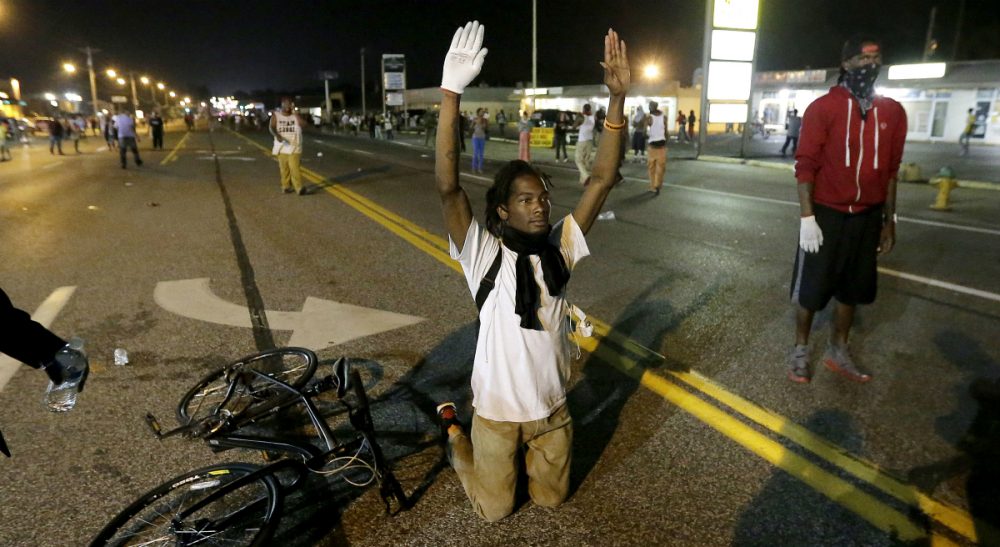Advertisement
Is Racism Too Entrenched To Be Defeated?

Do we need to know we can end racism in order to act against it?
I’m one of several co-leaders of a local workshop called “How White People Can Challenge Racism: Moving from Talk to Action,” where participants often express despair over the persistence of racism and the prospects for ending it.
Their pessimism reminds me of my own back in the 1990s, when I joined protests against first-strike nuclear missile proliferation that proved to no avail. Our civil disobedience, court arguments, and time in community service or in jail, did not end arms production. My memory of that failed effort depresses me still.
So when fellow white people proclaim: “Racism — it’ll never be fixed,” I understand their dismay. Even as I counter their defeatism with my father’s mantra: “If at first you don’t succeed, try, try again,” or Dr. Martin Luther King’s hopeful metaphor: “The arc of the moral universe is long, but it bends toward justice,” I wonder, just like they do, if racism is too entrenched in our country to ever be defeated.
...participants often express despair over the persistence of racism and the prospects for ending it.
And I cannot dismiss the discouragement of people of color who are weary of racial slights or outright discrimination that can crop up at any time, on the job, with white friends, or in public. Especially if you’re young and black:
You can be shot 41 times for holding up a wallet that Bronx police assume is a gun, like Amadou Diallo, age 22. You can be killed for picking up a BB rifle from the shelves of a Walmart in Ohio, as was John Crawford III, also 22. You can be struck dead by Oakland police while pinned face down, like Oscar Grant III, also age 22. Or gunned down for knocking on a stranger’s door to ask for help, like Renisha McBride, age 19, in Dearborn, Michigan. Or killed for “walking while black” on a street in Ferguson, Missouri, like Michael Brown, age 18. Or shot to death for playing loud music in your car as was Florida high school student Jordan Davis, 17. Or for wearing a hoodie in a Florida gated community, like Trayvon Martin, also 17. Or for waving a fake gun in a Cleveland park, like Tamir E. Rice, age 12, just last month.
The outlook for adult professionals of color is not necessarily more sanguine. “I am convinced that I will die in a society as racially divided as the one into which I was born more than a half century ago,” declared TransAfrica founder Randall Robinson in “Quitting America: The Departure of a Black Man from his Native Land,” explaining why he moved permanently to the Caribbean island of St. Kitts. And African-American scholar Derrick Bell asserts in “Faces at the Bottom of the Well: The Permanence of Racism” that “black people will never gain full equality in this country, a hard-to-accept fact that all history verifies.” The law professor sees racism as “an integral, permanent, and indestructible component of this society.”
Bell and Robinson’s pessimism seem to make racial justice activism useless. So I am skeptical when the white founder of Community Change, Boston’s racial justice organization, strangely finds inspiration in such views. “Accepting the permanence of racism is a way to eliminate despair as an option,” declares Horace Seldon in his 1992 essay. “If I no longer expect the elimination of racism, then I have no option to despair over the frustration of that goal. I am now free to attend fully to the present. Just knowing that I am engaged in the struggle is all that I have to ask for.”
Seldon’s attitude at first mystifies me, until I realize that I feel the same about gender inequality. Yes, men have dominated women throughout history, and most likely always will. But I’ll do anything I can to improve my gender’s chances for leading full and equal lives. Pessimism and persistence can co-exist.
I’ll take heart, not in 'we shall overcome' optimism, but in James Baldwin’s more realistic maxim: 'Not everything that is faced can be changed; but nothing can be changed until it is faced.'
The white sociologist Allan G. Johnson, in “Privilege, Power and Difference,” tells racial justice activists that they need to “let go of the idea that change doesn’t happen unless we’re around to see it.” And Jeff Hitchcock, in “Lifting the White Veil,” reminds us that “ever since whiteness arose as the dominant force in the racial structure of our society, it has been opposed as such by people it called White.” He urges us to “continue struggle that has taken generations, and will take generations to come,” to “stay with it: read, listen, dialogue, join, witness, protest, and participate. It’s about our future. You’ve got to keep going.”
I am now persuaded to take the long view — one that looks beyond my lifetime. I’ll take heart, not in “we shall overcome” optimism, but in James Baldwin’s more realistic maxim: “Not everything that is faced can be changed; but nothing can be changed until it is faced.” And I’ll take as my personal mantra, legal scholar Patricia J. Williams’s vision: “The solution to racism lies in our ability to see its ubiquity but not to concede to its inevitability.”
I may also need new metaphors, so I’ll picture the racial justice movement as a river moving toward an all-embracing ocean, seeking a way around every rock, beaver dam or concrete wall blocking its way.
A little like an arc, bending toward justice.
Related:
